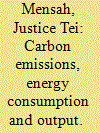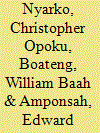|
|
|
Sort Order |
|
|
|
Items / Page
|
|
|
|
|
|
|
| Srl | Item |
| 1 |
ID:
132768


|
|
|
|
|
| Publication |
2014.
|
| Summary/Abstract |
Following the recent global economic downturn, attention has gradually shifted towards emerging economies which have experienced robust growth amidst sluggish growth of the world economy. A significant number of these emerging economies are in Africa. Rising growth in these economies is associated with surging demand for energy to propel the engines of growth, with direct implications on emissions into the atmosphere. Further, these economies are constantly being shaped by series of structural reforms with direct and indirect effects on growth, demand for energy, etc. To this end, this paper examines the causal dynamics among energy use, real GDP and CO2 emissions in the presence of regime shifts in six emerging African economies using the Gregory and Hansen (1996a). J. Econ. 70, 99-126 threshold cointegration and the Toda and Yamamoto (1995). J. Econometrics. 66, 225-250 Granger causality techniques. Results confirm the presence of regime shift effects in the long run inter-linkages among energy use, real GDP and CO2 emissions in the countries considered, thus indicating that structural changes have both economic and environmental effects. Hence, integration of energy and environmental policies into development plans is imperative towards attaining sustainable growth and development.
|
|
|
|
|
|
|
|
|
|
|
|
|
|
|
|
| 2 |
ID:
130919


|
|
|
|
|
| Publication |
2014.
|
| Summary/Abstract |
The success of individuals in securing employment requires a significant search effort. This article presents an empirical analysis of the determinants of job search intensity among a cross-section of workers in Accra, Ghana. Based on a sample of 404 workers drawn from 100 formal sector firms in Accra, we adopt the Poisson regression estimation technique to indicate that age, years of schooling, labour market experience, sex of household head, firm size and ethnic group significantly influence job search intensity. Measures to expose young job seekers to the world of work via internship and apprenticeship could accelerate their transition to employment.
|
|
|
|
|
|
|
|
|
|
|
|
|
|
|
|
| 3 |
ID:
130296


|
|
|
|
|
| Publication |
2014.
|
| Summary/Abstract |
Recent global policy attention to "land grabs" by international investors while very important, has diverted attention away from two other process that may be even more fundamentally affecting Africa's economic development trajectory: (1') the pace of land acquisitions by medium-scale African investors, who non-' control more land than large scale foreign investors in each of the three countries examine in this study (Ghana Kenya, and Zambia); and (ii) the overall impact of land transections on the viability of African governments' agricultural strategies, which for the most part remain predicated on smallholder led development and will require the expansion of cropland by smallholder household in Zambia and Ghana
|
|
|
|
|
|
|
|
|
|
|
|
|
|
|
|
| 4 |
ID:
118658


|
|
|
|
|
| Publication |
2012.
|
| Summary/Abstract |
As the largest African economy and the leading African aid-provider, with plans to establish an aid agency, South Africa is often ranked among the developing world's 'emerging donors'. However, the country's development cooperation commitments are smaller in scope, scale and ambition than the aid regimes of the BRIC (Brazil, Russia, India, China) or Gulf state donors. Given its limited resources and domestic socioeconomic challenges, South Africa prefers the role of 'development partner'. In this role, South Africa's development cooperation in Africa has ranged from peacekeeping, electoral reform and post-conflict reconstruction to support for strengthening regional and continental institutions, implementing the New Partnership for Africa's Development (NEPAD) and improving bilateral political and economic relations through dialogue and cooperation. This article seeks to determine whether Pretoria's development cooperation offers an alternative perspective to the aid policies and practices of the traditional and large rising donors. We conclude that South Africa does not fit neatly the 'donor' category of the Organization for Economic Cooperation and Development's (OECD's) Development Assistance Committee (DAC) and neither is Pretoria's aid-spending typically 'ODA' (official development assistance). Instead, with its new aid agency, South Africa occupies a unique space in Africa's development cooperation landscape. With fewer aid resources, but a 'comparative advantage' in understanding Africa's security/governance/development nexus, South Africa can play an instrumental role in facilitating trilateral partnerships, especially in Southern Africa.
|
|
|
|
|
|
|
|
|
|
|
|
|
|
|
|
|
|
|
|
|